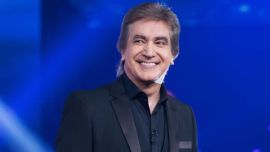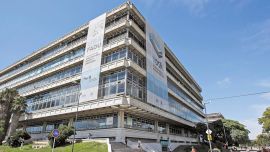Henry Kissinger, the child refugee who rose to become US secretary of state and defined United States foreign policy during the 1970s with his strategies to end the Vietnam War and contain communist countries, has died. He was 100.
He died on Wednesday at his home in Connecticut, Kissinger Associates said in a statement.
The Harvard University professor and diplomat earned praise for his role in opening China to the West, bringing about détente with the Soviet Union and initiating arms-control agreements under Republican Presidents Richard Nixon and Gerald Ford.
He earned the wrath of many for supporting massive bombing campaigns in Vietnam and Cambodia, backing the authoritarian regime of Chile’s Augusto Pinochet, Argentina's military dictators and turning a blind eye to genocide in East Timor and Bangladesh.
A Jew who fled Nazi persecution in his native Germany in 1938 at age 15, Kissinger developed a conservative outlook that would dominate his decision-making in government.
According to his realpolitik doctrine, diplomacy and force should be used to achieve balances of power. He had little use for idealism in formulating foreign policy, setting him at odds with human-rights advocates in his eight years in office as national security adviser and later as secretary of state, the top US diplomat.
Through a lens “shaped by pessimism and a dim view of humanity,” Kissinger saw the role of policy-makers as “not to steer the world along some preordained path to universal justice, but to pit power against power to rein in the assorted aggressions of human beings and to try, as best they can, to avert disaster,” Barry Gewen wrote in The Inevitability of Tragedy: Henry Kissinger and His World (2020).
Kissinger used this approach to justify Cold War policy decisions in remote theaters of conflict such as Vietnam, Chile and the Middle East. “If I had to choose between justice and disorder, on the one hand, and injustice and order, on the other, I would always choose the latter,” Kissinger said more than once, borrowing from writer Johann Wolfgang von Goethe.
Critics viewed his single-minded dedication to restricting Soviet hegemony, come what may, as a moral failure in the pursuit of what he considered a higher cause.
“Kissinger’s most salient trait, the one that underlay both his personality and his policies, was an intellectual brilliance that even his most ardent critics concede,” Walter Isaacson wrote in Kissinger: A Biography (1992). “In casual conversations or at formal meetings, he was able to weave together nuances and insights in a manner that brought discussions to a higher plane.”
Kissinger’s place in USsociety at times transcended diplomacy. The scholarly statesman who never lost his German accent and wore trademark black horn-rimmed glasses assumed quasi-cult status in the early 1970s, often overshadowing the reclusive Nixon by rubbing shoulders with Washington’s high-society Georgetown set and dating performers Jill St. John, Candice Bergen and Shirley MacLaine.
“Power is the ultimate aphrodisiac,” he explained.
As Nixon’s national security adviser, Kissinger fashioned a policy-making process based on secrecy and exclusion, catering to his boss’s disdain for bureaucracy by circumventing the State Department and defence officials. Nixon and Kissinger effectively ran foreign policy from the White House, back-channelling messages to international leaders without informing the offices responsible, according to Isaacson.
He also played to Nixon’s paranoia by ordering the wiretapping of subordinates and journalists to identify the source of information leaks. The expansive use of surveillance by the White House led to the president’s 1974 resignation over the Watergate scandal, which stemmed from an effort to bug the headquarters of the Democratic National Committee.
China thaw
By thawing US relations with China and achieving détente with the Soviet Union, Kissinger achieved what was called “triangular diplomacy.” Exploiting a rift between the two Communist countries, the Nixon administration drew China out of its diplomatic isolation and forced the Soviets to reshape their foreign policy.
Kissinger made secret trips to China in 1971 to pave the way for Nixon’s visit the following year. The diplomatic coup stunned the US public, which warmed to Kissinger’s secrecy for once.
The triangular approach was complete when Kissinger negotiated the agreement that would crystallise rapprochement with the Soviet Union: the Anti-Ballistic Missile Treaty of 1972, signed by Nixon and Soviet General Secretary Leonid Brezhnev. The two governments pledged, in hopes of cooling their arms race, not to deploy wide-scale defenses against strategic ballistic missiles.
The ABM Treaty was in force for 30 years until 2002, when the US withdrew from the agreement. Then-US President George W. Bush, in the wake of the 9/11 attacks of 2001, said the treaty hindered the United States' ability to protect itself from future attacks by terrorists or rogue states.
Bush said in a statement on Wednesday night that Kissinger “worked in the administrations of two presidents and counselled many more. I am grateful for that service and advice, but I am most grateful for his friendship.”
In later years, Kissinger’s attention, like that of his successors in Washington, turned to Asia.
On China, his 600-page book on the country’s history and diplomacy, was published in 2011, when he turned 88. In an interview at the Bloomberg New Economy Forum in 2020, he warned that the United States and China were “drifting increasingly toward confrontation” and risked pushing the world “into a catastrophe comparable to World War I.”
In July 2023, at age 100, Kissinger met with Chinese President Xi Jinping in Beijing to discuss US-China relations in his capacity as a private citizen.
Early years
Henry Alfred Kissinger was born on May 27, 1923, in Fuerth, a town in the German state of Bavaria. Known as Heinz until he moved to the US, he was the eldest son of Louis Kissinger, a schoolteacher, and his wife Paula, who was 13 years younger.
Withdrawn and awkward as a child, Kissinger took refuge in his studies at a local Jewish institution after he was refused entry to the state-run high school because of his ethnicity. As the persecution of Jews intensified, Kissinger’s mother arranged for the family’s emigration to the United States in 1938.
While studying at City College of New York, where he excelled as a student, Kissinger was drafted into the US Army at age 19. He became a private in the 84th Infantry Division and was assigned as an interpreter in the country of his birth.
When the war in Europe ended in May 1945, he served in the 970th Counterintelligence Corps as an occupation administrator, identifying and rounding up Gestapo officers for the US military while restoring order in a district near Frankfurt.
His return to the US began a 20-year association with Harvard University. In 1950, Kissinger received a bachelor’s degree with the highest honour, summa cum laude, before completing a master’s and a doctorate. His dissertation examined balances of power in 19th century Europe.
As a tenured member of Harvard’s Department of Government and an associate director of its Center for International Affairs, Kissinger cultivated relationships with policy makers as he gravitated toward public office. He also became a foreign-affairs consultant and close adviser to Nelson Rockefeller, who served as vice-president under Ford.
When Nixon came to office in January 1969, about half a million US troops were serving in Vietnam. Within about four years, the new administration would withdraw almost all of them while it sought a face-saving way out of a war that was becoming increasingly unpopular with the American public.
Secret meetings in Paris between Kissinger and North Vietnamese negotiator Le Duc Tho ultimately led to a ceasefire in 1973 and a Nobel Peace Prize for both men, an honor that Tho would decline.
Hard-line gestures
Yet the path to US extrication was littered with hard-line military gestures. Nixon and Kissinger raised the stakes in a bid to secure a more favorable peace deal for the South Vietnamese government, one that the US public wouldn’t view as humiliating. The fall of Saigon in 1975 rendered the cease-fire agreement almost meaningless, and critics claimed the Nixon administration had needlessly prolonged the war.
One of Kissinger’s most unpopular acts in government was masterminding Nixon’s secret war in Cambodia. In 1969 and 1970, American B-52 planes dropped more than 100,000 tons of bombs on Cambodia-based communist sanctuaries used by the North Vietnamese Army and the Viet Cong, also known as the National Front for the Liberation of South Vietnam.
Cambodia, a neutral nation governed by Prince Norodom Sihanouk at the time, was dragged into the Vietnam conflict by both sides, and the US incursions spread the influence of the Khmer Rouge, which would seize power in 1975. It then embarked on the genocide that killed almost two million people.
“The bombing became a turning point not only in the war but in the mentality of the White House,” journalist Seymour Hersh wrote in his 1983 book, The Price of Power, about Nixon and Kissinger’s decision to commence the raids. “The secret of that bombing, and hundreds of later missions, would be kept for five years. Eventually, the secret became more important to the White House than the bombing.”
In 1973, Kissinger engineered a lasting peace between Israel and Egypt after the Yom Kippur War by acting as an intermediary as part of “shuttle diplomacy” to resolve the conflict. Egypt and Syria’s attack on Israel ended in land concessions to the Arab countries, even though they had been outmaneuvered in the Sinai and the Golan Heights.
With the Egyptian army cut off and trapped in the desert, Kissinger applied pressure on Israel and gained favor with Egypt for salvaging a disastrous situation. Kissinger’s role in the peace deal created the conditions for Egypt’s later recognition of the Jewish state in 1979. Egyptian President Anwar Sadat paid for his olive branch with his life: In October 1981, he was gunned down by Islamic extremists during a military parade in Cairo.
In Latin America, Kissinger was embroiled in scandal over his alleged role in assassination plots. Dubbed Operation Condor, the 1970s campaign was waged by six security services of the region and led to the murder, disappearance or incarceration of an estimated 480,000 people. Keen to rein in communist influence in countries such as Chile and Argentina, Kissinger was accused of condoning such methods to prevent Marxist rule.
“I don’t see why we need to stand by and watch a country go communist due to the irresponsibility of its own people,” he was quoted as saying about Chile’s election of Salvador Allende, whose presidency and life ended in a 1973 coup led by Pinochet.
Lawsuits and private life
Kissinger was the subject of lawsuits filed by Chilean lawyers in the US and was asked to answer questions relating to the operation by courts in France, Chile, Argentina and Spain. He rejected such requests.
His life as a private citizen began when Ford left office in 1977. The former secretary of state had his own firm, New York-based Kissinger Associates. He consulted for Goldman, Sachs & Co., National Broadcasting Co. and Chase Manhattan Bank, and had a part-time professorship at Washington’s Georgetown University.
Kissinger was among many prominent former government leaders who served on the board of Theranos Inc, the blood-testing start-up that collapsed after its claims of revolutionary breakthroughs withered under scrutiny.
He married twice, the second time in 1974, while US secretary of state, to Nancy Maginnes. They had homes in Kent, Connecticut, and New York. With his first wife, the former Ann Fleischer, Kissinger had two children, David and Elizabeth. That marriage ended in divorce.
by David Henry, Bloomberg


























Comments